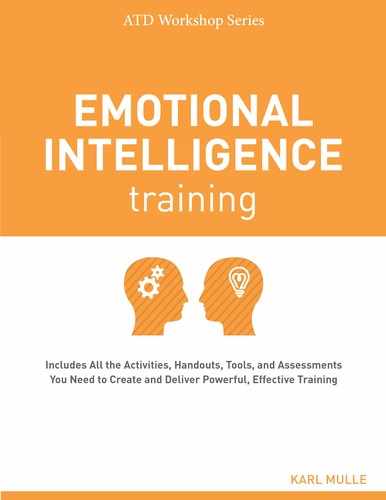Chapter 12
Assessments
What’s in This Chapter
• Four assessments to use in workshop sessions
• Instructions on how to fill out, score, and interpret the assessments
Assessments and evaluations are essential components of any workshop—before it begins, as it goes on, and when it concludes. To prepare an effective workshop for participants, you have to assess their needs and those of their organization. Although a formal needs assessment is outside the scope of this book, Chapter 5 will provide information on how you can identify participant needs.
Assessments, evaluations, and surveys used after the workshop are vital both for the organization and for you as the facilitator. Assessment 1 provides a workshop evaluation to help you discover if you and the workshop have met the goals and expectations of your participants. Although negative comments can be tough to read, ultimately they allow you to continually learn and improve your skills as a learning facilitator. Assessment 4: Facilitator Competencies provides an instrument to help you manage your professional development and increase the effectiveness of your training sessions. You can use this tool in a number of ways: self-assessment, end-of-course feedback, observer feedback, or as a gauge for tracking professional growth with repeated ratings.
Assessments 2 and 3 are learning tools you can use during a workshop to help participants identify areas of strength and potential development opportunities. When used at the beginning of a workshop, they can help the participants and the facilitator decide how to focus workshop time around potential learning goals. When used at the end of a workshop or as a takeaway tool, they can help participants create an action plan that builds on strengths and targets developmental goals.
Assessment 3 is not intended to replace more research-based assessment tools. It is, however, designed as a tool for participants to use their own emotional intelligence to measure their emotional intelligence. Given the reliability of self-awareness, the ideal way for participants to use this assessment is to answer each statement using a combination of self-awareness and feedback from others. In other words, the value of this assessment as a guide for personal development will be maximized if participants solicit the feedback of others, especially on those statements in which they may be somewhat uncertain about how to rate themselves. As participants rate themselves on each statement, they should ideally take a moment to reflect on whether or not their rating could benefit from someone else’s feedback. Each statement is a potential opportunity to open up a conversation with someone to gain valuable feedback.
Assessments Included in Emotional Intelligence Training
Assessment 1: Workshop Evaluation
Assessment 2: Collaborative Intention Self-Assessment
Assessment 3: Emotional Intelligence Quick Assessment
Assessment 4: Facilitator Competencies
Assessment 1: Workshop Evaluation


Assessment 2: Collaborative Intention Self-Assessment

Assessment 3: Emotional Intelligence Quick Assessment


Assessment 4: Facilitator Competencies







